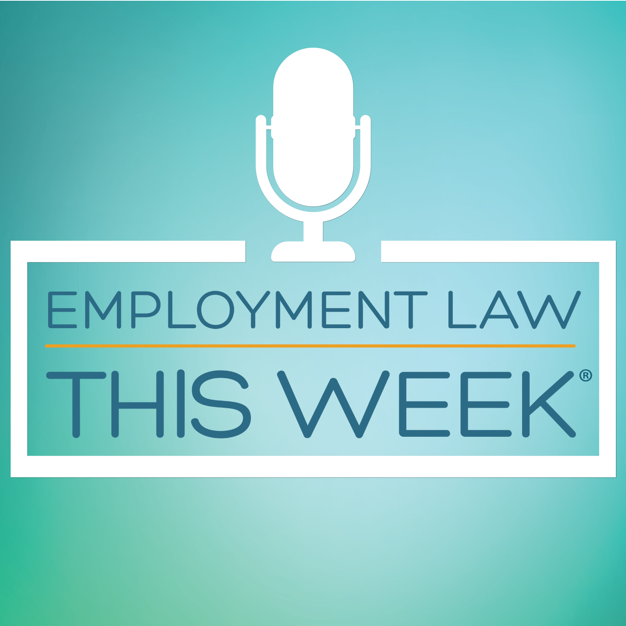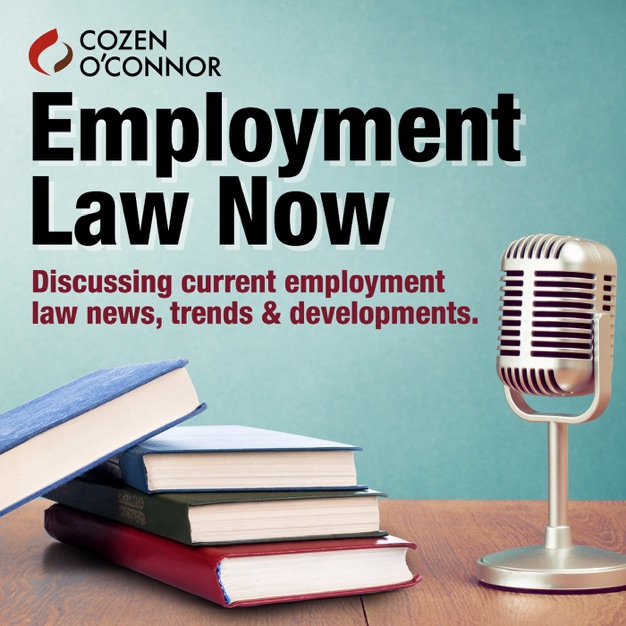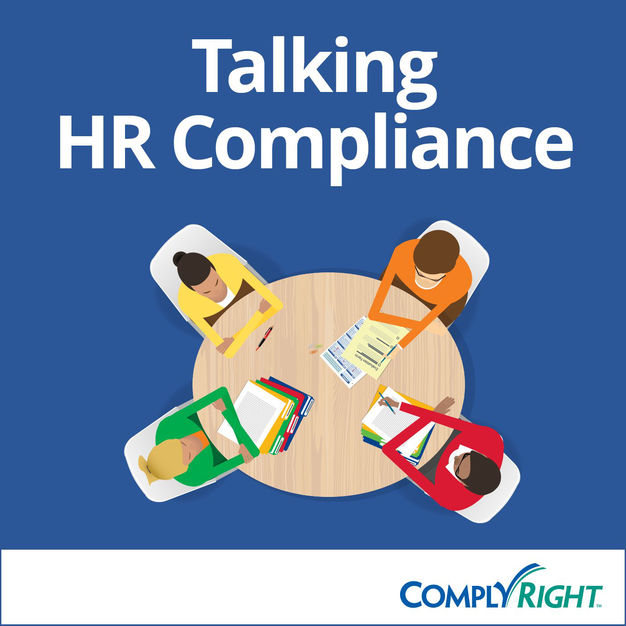
Employment Law This Week Podcast
Epstein Becker & Green, P.C.
Employment Law This Week® tracks the top developments in employment and labor law and workforce management in a matter of minutes every #WorkforceWednesday. This is the audio podcast version of the video series launched in October 2015 by law firm Epstein Becker Green.
- 5 minutes#WorkforceWednesday: Employment Law Changes Under President Trump
On January 20, 2025, President Trump began his second term. On his first day back, he signed a record-breaking number of executive orders, many of which have a direct impact on both public- and private-sector employers.
In this week’s episode, we turn to Epstein Becker Green attorney Paul DeCamp to help clients make sense of this flurry of activity. Tune in as Paul outlines what employers can anticipate from Trump 2.0 in the months ahead.
Visit our site for this week's Other Highlights and links: https://www.ebglaw.com/eltw376
Subscribe to #WorkforceWednesday: https://www.ebglaw.com/subscribe/
Visit http://www.EmploymentLawThisWeek.com
This podcast is presented by Epstein Becker & Green, P.C. All rights are reserved. This audio recording includes information about legal issues and legal developments. Such materials are for informational purposes only and may not reflect the most current legal developments. These informational materials are not intended, and should not be taken, as legal advice on any particular set of facts or circumstances, and these materials are not a substitute for the advice of competent counsel. The content reflects the personal views and opinions of the participants. No attorney-client relationship has been created by this audio recording. This audio recording may be considered attorney advertising in some jurisdictions under the applicable law and ethical rules. The determination of the need for legal services and the choice of a lawyer are extremely important decisions and should not be based solely upon advertisements or self-proclaimed expertise. No representation is made that the quality of the legal services to be performed is greater than the quality of legal services performed by other lawyers.
29 January 2025, 3:11 pm - 38 minutes 18 secondsSpilling Secrets: Trade Secret Litigation: Lessons from High-Stakes Group Exits
Group lift-outs are among the most challenging circumstances to navigate in the trade secrets and non-compete space. While possible in virtually every industry, they have become increasingly common in industries such as financial services, insurance, technology, and even design and apparel.
In this episode of Spilling Secrets, Epstein Becker Green attorneys Peter A. Steinmeyer, A. Millie Warner, Alexander C.B. Barnard, and Haley Morrison explain the myriad of complications that can arise in these scenarios, ranging from trade secret and non-compete violations to work-related emotional and abandonment issues.
Visit our site for this week’s other highlights and links: https://www.ebglaw.com/eltw375.
Spilling Secrets is a special monthly podcast series about the future of non-compete and trade secrets law.
We invite you to view Employment Law This Week® – learn about significant developments in employment and labor law and workforce management in a matter of minutes every #WorkforceWednesday®.
Watch the series and subscribe for email notifications: http://www.EmploymentLawThisWeek.com.
These materials have been provided for informational purposes only and are not intended and should not be construed to constitute legal advice. The content of these materials is copyrighted to Epstein Becker & Green, P.C. EMPLOYMENT LAW THIS WEEK® and #WorkforceWednesday® are registered trademarks of Epstein Becker & Green, P.C. ATTORNEY ADVERTISING.
22 January 2025, 2:56 pm - 3 minutes 12 seconds#WorkforceWednesday: PAGA in California, NLRB Authority, New Employment Laws in 2025
This week, while recognizing that it’s far from “business as usual” in California and keeping our friends and clients in mind, we look at a new ruling in California regarding Private Attorneys General Act (PAGA) arbitrations. We also examine a federal appeals court decision limiting the authority of the National Labor Relations Board (NLRB) and the flurry of new employment laws taking effect in 2025.
PAGA Ruling in California
In what’s seen as a win for California employers, the California Court of Appeal recently ruled that every PAGA action necessarily includes an individual PAGA action.
Third Circuit Limits NLRB’s Authority
Over the last year, the NLRB expanded its enforcement priorities and tested the limits of its authority. But the U.S. Court of Appeals for the Third Circuit finished 2024 with a rebuke of those efforts, curbing the NLRB's authority to order legal relief.
New Employment Laws in 2025
A new year brings new laws and regulations, many of which took effect on January 1. Employers can stay up to date on local and state laws and regulations by downloading our Wage & Hour Guide for Employers app, which is updated each February.
Visit our site for this week's Other Highlights and links: https://www.ebglaw.com/eltw374
Subscribe to #WorkforceWednesday: https://www.ebglaw.com/subscribe/
Visit http://www.EmploymentLawThisWeek.com
This podcast is presented by Epstein Becker & Green, P.C. All rights are reserved. This audio recording includes information about legal issues and legal developments. Such materials are for informational purposes only and may not reflect the most current legal developments. These informational materials are not intended, and should not be taken, as legal advice on any particular set of facts or circumstances, and these materials are not a substitute for the advice of competent counsel. The content reflects the personal views and opinions of the participants. No attorney-client relationship has been created by this audio recording. This audio recording may be considered attorney advertising in some jurisdictions under the applicable law and ethical rules. The determination of the need for legal services and the choice of a lawyer are extremely important decisions and should not be based solely upon advertisements or self-proclaimed expertise. No representation is made that the quality of the legal services to be performed is greater than the quality of legal services performed by other lawyers.
15 January 2025, 3:06 pm - 5 minutes 8 seconds#WorkforceWednesday: Employment Law in 2025: A Look Ahead
Happy New Year! As we kick off 2025, we’re exploring key legal trends for employers, with a focus on the implications of the incoming Trump administration.
In this episode, attorneys from Epstein Becker Green's Employment, Labor & Workforce Management practice discuss their predictions on how these changes could shape the employment law landscape in the year ahead.
Visit our site for this week's Other Highlights and links: https://www.ebglaw.com/eltw373
Subscribe to #WorkforceWednesday: https://www.ebglaw.com/subscribe/
Visit http://www.EmploymentLawThisWeek.com
This podcast is presented by Epstein Becker & Green, P.C. All rights are reserved. This audio recording includes information about legal issues and legal developments. Such materials are for informational purposes only and may not reflect the most current legal developments. These informational materials are not intended, and should not be taken, as legal advice on any particular set of facts or circumstances, and these materials are not a substitute for the advice of competent counsel. The content reflects the personal views and opinions of the participants. No attorney-client relationship has been created by this audio recording. This audio recording may be considered attorney advertising in some jurisdictions under the applicable law and ethical rules. The determination of the need for legal services and the choice of a lawyer are extremely important decisions and should not be based solely upon advertisements or self-proclaimed expertise. No representation is made that the quality of the legal services to be performed is greater than the quality of legal services performed by other lawyers.
8 January 2025, 3:03 pm - 7 minutes 18 seconds#WorkforceWednesday: 2024 Workforce Review: Top Labor and Employment Law Trends and Updates
It has been a pivotal year for employers, marked by challenges to federal agency authority, sweeping state-level regulatory changes, and the looming impact of a presidential election poised to reshape labor laws nationwide.
In this episode, attorneys from Epstein Becker Green's Employment, Labor & Workforce Management practice reflect on these challenges, address key client pain points, and share their insights on what the future may bring.
Visit our site for this week's Other Highlights and links: https://www.ebglaw.com/eltw372
Subscribe to #WorkforceWednesday: https://www.ebglaw.com/subscribe/
Visit http://www.EmploymentLawThisWeek.com
This podcast is presented by Epstein Becker & Green, P.C. All rights are reserved. This audio recording includes information about legal issues and legal developments. Such materials are for informational purposes only and may not reflect the most current legal developments. These informational materials are not intended, and should not be taken, as legal advice on any particular set of facts or circumstances, and these materials are not a substitute for the advice of competent counsel. The content reflects the personal views and opinions of the participants. No attorney-client relationship has been created by this audio recording. This audio recording may be considered attorney advertising in some jurisdictions under the applicable law and ethical rules. The determination of the need for legal services and the choice of a lawyer are extremely important decisions and should not be based solely upon advertisements or self-proclaimed expertise. No representation is made that the quality of the legal services to be performed is greater than the quality of legal services performed by other lawyers.
18 December 2024, 3:09 pm - 30 minutes 19 secondsSpilling Secrets: 2024’s Biggest Trade Secrets and Non-Compete Developments
This year has been a rollercoaster for trade secrets and non-compete law. We’ve seen major legal battles at both the federal and state levels impacting employers across the nation.
In this episode of Spilling Secrets, Epstein Becker Green attorneys Peter A. Steinmeyer, Daniel R. Levy, Katherine G. Rigby, A. Millie Warner, and Erik W. Weibust recap 2024’s most significant updates, including the Federal Trade Commission’s non-compete ban, the National Labor Relations Board’s general counsel memo, state-level trends, and much more.
Visit our site for this week's Other Highlights and links: https://www.ebglaw.com/eltw371
Subscribe - https://www.ebglaw.com/subscribe/.
Visit http://www.EmploymentLawThisWeek.com.
This podcast is presented by Epstein Becker & Green, P.C. All rights are reserved. This audio recording includes information about legal issues and legal developments. Such materials are for informational purposes only and may not reflect the most current legal developments. These informational materials are not intended, and should not be taken, as legal advice on any particular set of facts or circumstances, and these materials are not a substitute for the advice of competent counsel. The content reflects the personal views and opinions of the participants. No attorney-client relationship has been created by this audio recording. This audio recording may be considered attorney advertising in some jurisdictions under the applicable law and ethical rules. The determination of the need for legal services and the choice of a lawyer are extremely important decisions and should not be based solely upon advertisements or self-proclaimed expertise. No representation is made that the quality of the legal services to be performed is greater than the quality of legal services performed by other lawyers.
11 December 2024, 1:54 pm - 4 minutes 44 seconds#WorkforceWednesday: Biden’s Final Labor Moves
This week, we're highlighting several last-minute changes from federal agencies before the Trump administration takes office. These include the National Labor Relations Board’s (NLRB’s) recent ban on captive audience meetings, a federal judge's decision to vacate the Department of Labor's (DOL’s) overtime rule, and the return of Wage and Hour Division opinion letters.
NLRB Outlaws Captive Audience Meetings
On November 13, 2024, the NLRB outlawed captive audience meetings, overturning nearly 80 years of precedent and removing a widely used tool for employers. Employers may still hold such meetings, but employee attendance cannot be mandatory.
Federal Judge Strikes Down DOL Overtime Rule
Earlier this year, the Biden administration's DOL released a final rule raising the salary threshold for overtime pay. On November 15, 2024, a federal judge in Texas vacated this overtime rule nationwide, not only preventing future increases from taking effect but also retroactively nullifying the increases implemented in July.
The Return of Wage and Hour Opinion Letters
We saw more last-minute action this month with the sudden return of Wage and Hour Division opinion letters. One such letter addresses overtime calculations, and the other details the use of leave under the Family and Medical Leave Act. During his first term, President Trump issued about 80 letters, whereas President Biden, following President Obama's approach, has released only four, including the two this month.
Visit our site for this week's Other Highlights and links: https://www.ebglaw.com/eltw370
Subscribe to #WorkforceWednesday: https://www.ebglaw.com/subscribe/
Visit http://www.EmploymentLawThisWeek.com
This podcast is presented by Epstein Becker & Green, P.C. All rights are reserved. This audio recording includes information about legal issues and legal developments. Such materials are for informational purposes only and may not reflect the most current legal developments. These informational materials are not intended, and should not be taken, as legal advice on any particular set of facts or circumstances, and these materials are not a substitute for the advice of competent counsel. The content reflects the personal views and opinions of the participants. No attorney-client relationship has been created by this audio recording. This audio recording may be considered attorney advertising in some jurisdictions under the applicable law and ethical rules. The determination of the need for legal services and the choice of a lawyer are extremely important decisions and should not be based solely upon advertisements or self-proclaimed expertise. No representation is made that the quality of the legal services to be performed is greater than the quality of legal services performed by other lawyers.
27 November 2024, 3:00 pm - 17 minutes 45 secondsSpilling Secrets: Beyond Non-Competes: IP and Trade Secret Assessment Strategies for Employers
With non-compete agreements facing continual legal pressure, what are some other ways employers can protect their trade secrets and IP?
In this episode of Spilling Secrets, Epstein Becker Green attorneys Daniel R. Levy, Gregory J. Krabacher, and Hemant Gupta describe how IP audits and trade secret assessments can offer a uniquely targeted approach to protecting sensitive information, ensuring a company has a grasp of the full scope of their assets.
Visit our site for this week's Other Highlights and links: https://www.ebglaw.com/eltw369
Subscribe - https://www.ebglaw.com/subscribe/.
Visit http://www.EmploymentLawThisWeek.com.
This podcast is presented by Epstein Becker & Green, P.C. All rights are reserved. This audio recording includes information about legal issues and legal developments. Such materials are for informational purposes only and may not reflect the most current legal developments. These informational materials are not intended, and should not be taken, as legal advice on any particular set of facts or circumstances, and these materials are not a substitute for the advice of competent counsel. The content reflects the personal views and opinions of the participants. No attorney-client relationship has been created by this audio recording. This audio recording may be considered attorney advertising in some jurisdictions under the applicable law and ethical rules. The determination of the need for legal services and the choice of a lawyer are extremely important decisions and should not be based solely upon advertisements or self-proclaimed expertise. No representation is made that the quality of the legal services to be performed is greater than the quality of legal services performed by other lawyers.
20 November 2024, 3:03 pm - 4 minutes 38 seconds#WorkforceWednesday: What a Trump Win Means for Unions
This week, we're analyzing how the upcoming Trump administration may affect National Labor Relations Board (NLRB) policies and enforcement priorities promoting union activity, recent court decisions on union protections, and high-profile strikes and evolving worker demands.
NLRB Limits Employer Statements on Union Impact
The Biden administration and the NLRB have been aggressive in pursuing policies and enforcement priorities that promote activity. Just last week, in a case involving Starbucks, the NLRB overturned a 40-year precedent to restrict employers’ ability to describe the consequences of unionization to employees. The incoming administration can make some immediate changes here, such as replacing the NLRB General Counsel, but replacing board members takes more time, and other factors beyond executive policy impact the organizing environment.
Courts Limit and Expand Protections
The courts have both limited and expanded protections for union organizing. For example, the U.S. Court of Appeals for the Fifth Circuit revived a pilot union lawsuit for retaliation against union activity based on recent U.S. Supreme Court precedent. On the other hand, several cases challenging the way NLRB members are appointed are working their way through the courts, setting up the possibility that President Trump could have a more immediate policy impact.
Boeing Strike Highlights New Union Demands
High-profile strikes and work stoppages could also impact future union activity, such as the recent Boeing strike. These labor actions could continue during the new administration as workers push for more benefits and protections.
Visit our site for this week's Other Highlights and links: https://www.ebglaw.com/eltw368
Subscribe to #WorkforceWednesday: https://www.ebglaw.com/subscribe/
Visit http://www.EmploymentLawThisWeek.com
This podcast is presented by Epstein Becker & Green, P.C. All rights are reserved. This audio recording includes information about legal issues and legal developments. Such materials are for informational purposes only and may not reflect the most current legal developments. These informational materials are not intended, and should not be taken, as legal advice on any particular set of facts or circumstances, and these materials are not a substitute for the advice of competent counsel. The content reflects the personal views and opinions of the participants. No attorney-client relationship has been created by this audio recording. This audio recording may be considered attorney advertising in some jurisdictions under the applicable law and ethical rules. The determination of the need for legal services and the choice of a lawyer are extremely important decisions and should not be based solely upon advertisements or self-proclaimed expertise. No representation is made that the quality of the legal services to be performed is greater than the quality of legal services performed by other lawyers.
13 November 2024, 2:59 pm - 3 minutes 52 seconds#WorkforceWednesday: How to Navigate Employee Stress After Election Day
Both political parties have called this the most consequential election in recent history, which means that this morning in your workplace, some employees are celebrating, and others might be feeling hurt, disappointed, or maybe even fearful. What can employers do to help?
Epstein Becker Green attorneys Susan Gross Sholinsky and Michael S. Ferrell outline proactive strategies employers can adopt to prevent potential workplace incidents and describe protections surrounding political speech, as governed by laws like the National Labor Relations Act.
Visit our site for this week's Other Highlights and links: https://www.ebglaw.com/eltw367
Subscribe to #WorkforceWednesday: https://www.ebglaw.com/subscribe/
Visit http://www.EmploymentLawThisWeek.com
This podcast is presented by Epstein Becker & Green, P.C. All rights are reserved. This audio recording includes information about legal issues and legal developments. Such materials are for informational purposes only and may not reflect the most current legal developments. These informational materials are not intended, and should not be taken, as legal advice on any particular set of facts or circumstances, and these materials are not a substitute for the advice of competent counsel. The content reflects the personal views and opinions of the participants. No attorney-client relationship has been created by this audio recording. This audio recording may be considered attorney advertising in some jurisdictions under the applicable law and ethical rules. The determination of the need for legal services and the choice of a lawyer are extremely important decisions and should not be based solely upon advertisements or self-proclaimed expertise. No representation is made that the quality of the legal services to be performed is greater than the quality of legal services performed by other lawyers.
6 November 2024, 2:57 pm - 21 minutes 31 secondsSpilling Secrets: Wizarding and the World of Trade Secrets
Prepare to be spellbound this Halloween as we cast a magical twist on the realm of trade secrets and restrictive covenants! Whether you're a Gryffindor at heart or more of a Slytherin, there's something for every magical mind seeking to safeguard their organization’s trade secrets.
In this episode of Spilling Secrets, Epstein Becker Green attorneys A. Millie Warner, Jill K. Bigler, and Aime Dempsey team up with Kristen O’Connor—Senior Assistant General Counsel, Employment at Marsh & McLennan Companies—to wave their legal wands over topics such as Professor Snape’s secret potion book, Hermione’s clever jinxes, and much more.
Visit our site for this week's Other Highlights and links: https://www.ebglaw.com/eltw366
Subscribe - https://www.ebglaw.com/subscribe/.
Visit http://www.EmploymentLawThisWeek.com.
This podcast is presented by Epstein Becker & Green, P.C. All rights are reserved. This audio recording includes information about legal issues and legal developments. Such materials are for informational purposes only and may not reflect the most current legal developments. These informational materials are not intended, and should not be taken, as legal advice on any particular set of facts or circumstances, and these materials are not a substitute for the advice of competent counsel. The content reflects the personal views and opinions of the participants. No attorney-client relationship has been created by this audio recording. This audio recording may be considered attorney advertising in some jurisdictions under the applicable law and ethical rules. The determination of the need for legal services and the choice of a lawyer are extremely important decisions and should not be based solely upon advertisements or self-proclaimed expertise. No representation is made that the quality of the legal services to be performed is greater than the quality of legal services performed by other lawyers.
30 October 2024, 1:55 pm - More Episodes? Get the App
Your feedback is valuable to us. Should you encounter any bugs, glitches, lack of functionality or other problems, please email us on [email protected] or join Moon.FM Telegram Group where you can talk directly to the dev team who are happy to answer any queries.
 Littler Labor & Employment Podcast
Littler Labor & Employment Podcast
 Employment Law Now
Employment Law Now
 Ogletree Deakins Podcasts
Ogletree Deakins Podcasts
 Talking HR Compliance — A Small Business Podcast
Talking HR Compliance — A Small Business Podcast
 Employment Matters
Employment Matters